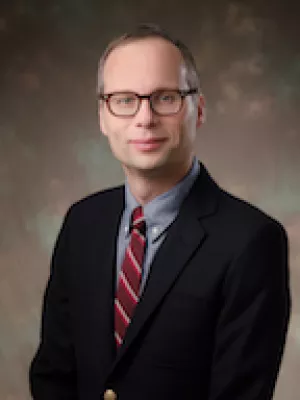Education
- Medical University Lübeck, Germany, 10/1989 - 07/1995
- Harvard Medical School, Boston, MA 08/1995 - 04/1996
- University of Münster, Germany, 05/1996 - 12/1996
- University of Münster, Germany, Department of Pediatrics, Medical Intern, 02/1997 - 07/1998
- University of Münster, Germany, Department of Pediatrics, Medical Resident, 08/1998 - 09/2001
- Oregon Health & Science University, Portland, Oregon, Department of Molecular and Medical Genetics, 10/2001 -10/2005
In the News
Grants and Funding
- Next-generation human liver gene therapy | NIH | 2021-09-30 - 2026-06-30 | Role: Principal Investigator
- Microphysiological systems to interrogate the Islet-Liver-Adipose Axis in normal physiology and Type-2 Diabetes Mellitus | NIH | 2018-09-20 - 2023-07-31 | Role: Co-Principal Investigator
- Targeting AAV vectors to cell types involved in alcohol-induced liver injury | NIH | 2018-09-01 - 2023-05-31 | Role: Principal Investigator
- Building a functional biliary system from hepatocytes | NIH | 2016-09-01 - 2021-07-31 | Role: Co-Principal Investigator
- Microphysiological systems to interrogate the Islet-Liver-Adipose Axis in normal physiology and Type-2 Diabetes Mellitus | NIH | 2018-09-20 - 2020-07-31 | Role: Co-Principal Investigator
- Myofibroblast-to-hepatocyte conversion as a therapy for alcoholic liver disease | NIH | 2013-09-01 - 2016-08-31 | Role: Principal Investigator
- Liver regeneration with stems cells of uniparental origin | NIH | 2008-04-01 - 2013-08-31 | Role: Co-Principal Investigator
Research Narrative
Our research is aimed at developing new therapies for patients with severe liver diseases. To restore liver function in patients with liver failure, we are working on generating hepatocytes from human pluripotent stem cells or by reprogramming of readily accessible human cell types. To be therapeutically effective, these cells need to replicate both function and the ability to proliferate of primary human hepatocytes. To establish and improve protocols for the production of such cells, we have been working on obtaining a detailed molecular understanding of hepatocyte differentiation and regeneration. For this, we are using mouse models for liver cell lineage tracing developed in our laboratory. In addition, we are using rigorous animal models of human liver failure to test the therapeutic efficacy of our surrogate hepatocytes. While developing novel liver cell therapies is our main focus, we are also using hepatocytes derived from human pluripotent stem cells or by reprogramming to generate in vitro and in vivo liver disease models. Another goal of our laboratory is to determine the origin and follow the fate of liver cancer-initiating cells with the goal to identify the molecular mechanisms that drive liver cancer formation and progression. For this, we are using new mouse models generated in our laboratory. By obtaining an improved understanding of hepatocarcinogenesis, we hope to contribute to the development of strategies for early detection and effective eradication of liver cancer.
Research Interests
Liver Regeneration
Liver Cell Therapy
LIver Development
Research Pathways
Publications
- ????????in vitro???.| | UCSF Research Profile
- A reproducible and well-tolerated method for 2/3 partial hepatectomy in mice.| | PubMed
- On the origin of the term "stem cell".| | PubMed
- Myeloid lineage progenitors give rise to vascular endothelium.| | PubMed
- Bone marrow-derived cells fuse with normal and transformed intestinal stem cells.| | PubMed
- Sustained phosphorylation of Bid is a marker for resistance to Fas-induced apoptosis during chronic liver diseases.| | PubMed
- Myeloid Lineage-Restricted Progenitors Contribute to Vascular Endothelium.| | UCSF Research Profile
- In vivo genetic selection of renal proximal tubules.| | PubMed
- Therapeutic cell fusion.| | PubMed
- Delineating the hepatocyte's hematopoietic fusion partner.| | PubMed

